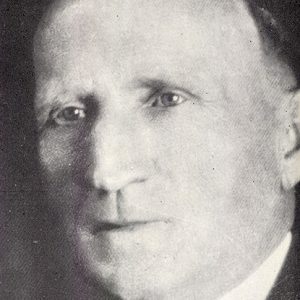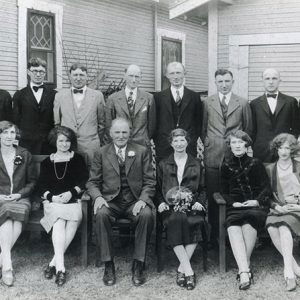calsfoundation@cals.org
Wade Hampton Kitchens (1878–1966)
Wade Hampton Kitchens was a Democratic member of the U.S. House of Representatives. He represented the Fourth District of Arkansas in the Seventy-fifth and Seventy-sixth Congresses from 1937 to 1941.
Wade Hampton Kitchens was born on December 26, 1878, on a farm near Falcon (Nevada County) to James Monroe Kitchens and Margret Sherrill Kitchens. He had eleven siblings. His formal education included the area’s local common schools, Southern Academy, and then the University of Arkansas (UA) in Fayetteville (Washington County), which he attended from 1895 to 1898. With no academic legal education available at the university or anywhere within the state, Kitchens left UA and continued his formal studies at the law department of Cumberland University in Lebanon, Tennessee, from which he graduated in 1900 with an LLD.
He was admitted to the bar in 1900 and practiced law in Manila and Lingayen in the Philippines for most of the next decade, having settled in the Philippines after serving in the U.S. Army. Indeed, well before he engaged in public service through elective office, Kitchens had compiled a strong record of service in the military. He was a sergeant in Company I of the First Arkansas Regiment during the Spanish-American War in 1898, and then from 1900 to 1902, during the Philippine Insurrection, he was a private in Company E, Twentieth and Second United States Infantry. With the onset of World War I, Kitchens again enlisted in the U.S. Army on May 18, 1917. Commissioned as a captain of the infantry on August 5, 1917, he served overseas before the war ended in November 1918.
In 1906, Kitchens married Lillie Dempsey; they had two children. Returning to Arkansas in 1909, Kitchens set up a legal practice in Magnolia (Columbia County) and began to get involved in the community. His first foray into partisan politics involved serving as a delegate to the Democratic state conventions in Little Rock (Pulaski County) in 1910 and 1912, but it was not until almost two decades later that he first sought elective office, running for and winning a seat in the Arkansas House of Representatives in 1928. He was reelected in 1930 but retired at the end of that term.
In 1934, with the country reeling from the effects of the Great Depression, Kitchens returned to politics, challenging seven-term incumbent Tilman B. Parks for the Democratic nomination for the House of Representatives in Arkansas’s Seventh Congressional District. The contest dissolved into a legal uproar, one that was not resolved until the spring of 1935. Parks was initially declared the winner of the Democratic primary, but, alleging voter fraud, Kitchens challenged the result in court. As the legal battle dragged on, Kitchens pressed his claim. It was a futile effort, as Parks emerged as the overwhelming victor in the general election. Parks was sworn in as a member of the Seventy-fourth Congress in January 1935, but shortly thereafter, a federal court overturned the August result and declared Kitchens the primary winner. The effort was to no avail, as state officials determined that, given the constitutional provision that provided that the House should be the judge of its members, and with Parks having been sworn in back in January, his claim to the seat was secure, and they had no authority to issue a call for a new election.
It proved to be the final victory of Parks’s career, for in the aftermath of the fractious battle, he opted to retire rather than seek a ninth term. This left the way open for Kitchens, who won the Democratic primary handily before winning an uncontested victory in the general election. He joined a freshman congressional class whose Democratic ranks were swelled to historic proportions by Franklin Roosevelt’s landslide reelection victory. Two years later in 1938, despite another economic downturn and growing divisions within the Democratic Party, Kitchens ran unopposed in the general election.
For all his efforts to achieve election to the House, his tenure as a congressman was relatively undistinguished. Reflective of the overwhelming importance of seniority in the Congress of that era, Kitchens had little real impact on policy over the course of his two terms. Generally a loyal and attentive supporter of the president, whose New Deal programs did much for the beleaguered state economy, Kitchens served on the Civil Service, Food Control, and Education committees, as well as the Committee of Accounts, but he had little substantive influence on the committees’ legislative efforts. Kitchens was a strong supporter of legislation benefitting veterans and their families, as well as the agricultural interests central to his district.
The 1940 election signaled the end of Kitchens’s Washington DC career, as he lost a primary challenge by Oren Harris, an ambitious local prosecutor. Harris’s high-profile prosecutorial efforts, coupled with a message that he would be better able than the older incumbent to provide energetic leadership, propelled Harris to a narrow victory, but not before Kitchens challenged the tally, claiming that not all votes had been counted. Unlike the 1934 contest, this dispute was settled quickly, with Harris ultimately declared the winner. After the defeat, Kitchens returned to Magnolia, where he resumed the practice of law.
Kitchens died in Magnolia on August 22, 1966. He is buried in Columbia Cemetery in Waldo (Columbia County).
For additional information:
“Decision Delayed in Election Suit, Now Hearing Close.” Hope Star, January 10, 1935, p. 1.
“Kitchens Asks Probe of Vote.” Hope Star, August 15, 1940, p. 1.
“Kitchens Is Ruled Elected.” Hope Star, January 18, 1935, p. 1.
“Kitchens Virtually Assured Victory in Race for Congress.” Hope Star, August 12, 1936, p. 1.
“State Powerless to Call Special Election Vote for Kitchens.” Hope Star, April 1, 1935, p. 1.
“Vote Canvass Made Friday.” Hope Star, August 16, 1940, p. 1.
“Wade Hampton Kitchens.” Biographical Directory of the United States Congress. http://bioguide.congress.gov/scripts/biodisplay.pl?index=K000248 (accessed June 26, 2025).
William H. Pruden III
Ravenscroft School







Wade H. Kitchens had eleven siblings: four girls and seven boys. They all grew to adulthood and attended their parents’ Golden Wedding Anniversary (very unusual for that day and time).
My grandfather was Wade’s brother Herschell M. Kitchens. He and three brothers were MDs. All the brothers and two sisters graduated from the University of Arkansas. (The parents could not read or write–Do we value education that highly today?)
I was always told that Wade was confident about the election but accepted defeat. Only when so many people told him that they and their family/friends had voted for him did he begin to compare the returns. Too late, he realized the election had been stolen and began the effort to gain the seat.